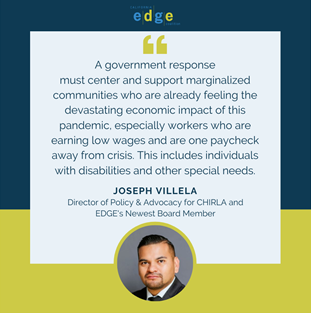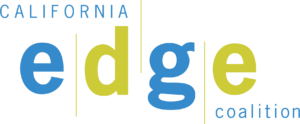
- You are the Director of Policy & Advocacy for the Coalition for Humane Immigrant Rights (CHIRLA). CHIRLA is a newly elected EDGE Coalition Board Member. Please tell us about CHIRLA and the work you do with the organization.
The Coalition for Humane Immigrant Rights (CHIRLA) was founded in 1986. CHIRLA is a California leader with national impact made of diverse immigrant families and individuals who act as agents of social change to achieve a world with freedom of mobility, full human rights, and true participatory democracy. CHIRLA’s mission is to achieve a just society fully inclusive of immigrants.
For the past fifteen years, I have dedicated my career to effecting policy change through direct engagement with immigrants and other impacted communities. As Director of Policy and Advocacy, I have been privileged to advance systems change with the guidance and leadership of our impacted communities.
- How is CHIRLA’s mission and programming reflective of CA’s diverse communities?
CHIRLA organizes and serves individuals, institutions and coalitions to build power, transform public opinion, and change policies to achieve full human, civil and labor rights. Guided by the power, love, and vision of our community, CHIRLA embraces and drives progressive social change. For over 30 years, CHIRLA’s innovative programming in community education, community organizing, legal services, civic engagement, policy and advocacy, and leadership development for youth has served the immigrant communities of the Los Angeles region and throughout California.
- CHIRLA focuses heavily on organizing and advocating for CA’s immigrant workforce. What does that work look like right now during this pandemic?
The current coronavirus (COVID-19) outbreak is not just a public health emergency, it’s an economic crisis, and both disproportionately affect the most vulnerable among us. As COVID-19 continues to take its toll, CHIRLA has focused on demanding government officials protect our communities as they confront and attempt to mitigate this pandemic’s impact. It’s critical a government response centers and supports marginalized communities who are already feeling the devastating economic impacts, especially workers who are earning low wages and are one paycheck away from crisis. This includes individuals with disabilities and other special needs.
Immigrants face particular challenges during this time because of lack of access to public services due to immigration restriction. Furthermore, language access is another barrier. There are over 200 languages spoken in our state, with little to no interpretation available for indigenous speaking communities like Hmong, Zapotecs and Mixtecs. Mixed legal status is common in Immigrant households, which can hinder them from seeking assistance for fear of losing status or putting a family member at risk.
One of CHIRLA’s tenets, to fight shoulder to shoulder with immigrants, continued despite the pandemic, as our organizing and advocacy models went digital. For instance, our annual day of action in Sacramento was virtual and allowed more than 200 immigrant families to engage with elected officials.
- As a new Coalition Member, how does EDGE’s newly released policy agenda align with CHIRLA’s goals for the coming year?
Prior to COVID-19, income inequality was already amplified, and poverty rates grew among communities of color as the state’s economy outperformed the Nation’s. COVID-19 pulled back the veil of the economic inequalities that communities of color have faced. Unfortunately, they’ve become more acute during this pandemic. In 2008, we faced a macro-recession affecting the stock market, employers and workers, whereas the current economic crisis we are facing is micro, affecting only low-wage workers. EDGE’s vision to reimagine investments for small business, workers, and an inclusive economy is aligned with CHIRLA’s vision.
- Winter holidays and the New Year are coming up quick and looking very different due to COVID. A lot of people are exploring alternatives to the usual in-person get togethers. Can you share one of your favorite holiday or New Year traditions and how you will be modifying for COVID safety?
The most difficult part of COVID-19 is the fact that we can’t socialize and be with our loved ones. The best way to mitigate the current challenges is to facetime a lot, and who knows, maybe I will continue to use it after we go back to normality.
